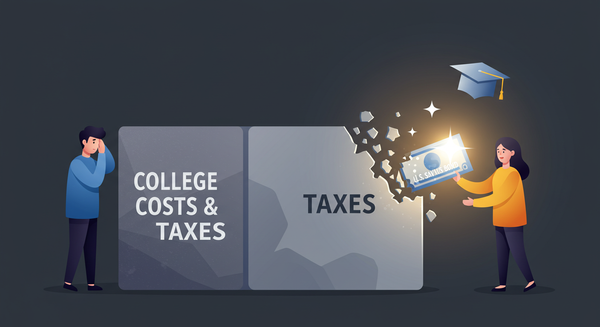Got Education Money? Let's Talk Taxes on Scholarships, Grants and Tuition Reductions
Planning for education costs often involves navigating a maze of financial aid, scholarships, and grants. It's exciting to receive this support, but you might be wondering: is this money going to be taxed? Chapter 1 of IRS Publication 970, "Tax Benefits for Education," sheds light on this important topic, specifically addressing scholarships, fellowship grants, and tuition reductions. Let's break it down in a way that's easy to understand.
Understanding Scholarships and Fellowship Grants: The General Rule
Generally, if you receive a scholarship or fellowship grant, the money might not be considered taxable income. This is great news! However, there are specific conditions you need to meet for this tax-free treatment.
Key Conditions for Tax-Free Scholarships and Grants:
- You must be a candidate for a degree at an eligible educational institution. This means you are attending a primary or secondary school, pursuing a degree at a college or university, or attending an institution that provides a program acceptable for full credit toward a bachelor's or higher degree or offers training to prepare students for gainful employment in a recognized occupation.
- The scholarship or grant must be used for qualified education expenses. These expenses generally include:
- Tuition and fees required for enrollment or attendance.
- Books, supplies, and equipment required for your courses.
Important Exceptions: When Scholarships and Grants Become Taxable
While many scholarships and grants can be tax-free, there are situations where you'll need to include them as part of your gross income.
- Payment for Services: If you receive a scholarship or grant that requires you to perform services like teaching, research, or other work as a condition of receiving the funds, the portion representing payment for these services is taxable. Your scholarship provider should issue you a Form W-2 showing this income.
- Amounts Used for Non-Qualified Expenses: If any part of your scholarship or grant is used for expenses other than qualified education expenses (like room and board, personal expenses, or travel), that portion is taxable.
- Non-Degree Candidates: If you receive a scholarship or fellowship grant and you are not a candidate for a degree at an eligible educational institution, the entire amount is taxable.
- Scholarships Requiring Future Services: If your scholarship requires you to perform future services (like in some medical school programs) and there's a substantial penalty if you don't comply, the entire grant might be taxable in the year you receive it.
- Athletic Scholarships: While athletic scholarships can be tax-free if they meet the general requirements, it's important to note that they are only tax-free to the extent they cover qualified education expenses.
Figuring Out What's Taxable: Worksheet 1-1
If you're unsure how much of your scholarship or grant is taxable, Chapter 1 provides Worksheet 1-1 to help you figure it out. This worksheet guides you through subtracting any amounts for services or non-qualified expenses to determine the tax-free portion.
Reporting Taxable Scholarship and Fellowship Income
If any part of your scholarship or fellowship grant is taxable, you need to report it on your tax return.
- If the taxable amount is shown in box 1 of Form W-2, you'll include it with your other wages on Form 1040 or 1040-SR, line 1a.
- If you have a taxable amount that wasn't reported on a Form W-2, you'll generally report it on Schedule 1 (Form 1040), line 8r.
Tuition Reductions: Another Form of Educational Assistance
Besides scholarships and grants, some educational institutions offer tuition reductions to their employees, their spouses, and their dependent children. Generally, a qualified tuition reduction is not included in your gross income.
Important Considerations for Tuition Reductions:
- The reduction must be offered by an eligible educational institution to its employees (or their families).
- For officers, owners, and highly compensated employees, the tuition reduction must be available to employees on a nondiscriminatory basis.
- Similar to scholarships, if a tuition reduction represents payment for teaching, research, or other services required of the student, that portion is generally taxable income.
Other Educational Assistance Mentioned in Chapter 1
Chapter 1 also briefly touches upon other forms of educational assistance:
- Higher education emergency grants provided under specific federal programs are not included in your gross income.
- Veterans' benefits, such as payments for education, training, or subsistence under laws administered by the Department of Veterans Affairs (VA), are generally tax-free.
- Payments received by cadets and midshipmen at U.S. military academies are considered pay for personal services and are taxable.
The Bottom Line
Understanding the tax implications of scholarships, grants, and tuition reductions is crucial for accurate tax planning. While many forms of educational assistance can be tax-free, it's essential to be aware of the conditions and exceptions outlined in IRS Publication 970, Chapter 1. By knowing the rules, you can properly determine your taxable income and avoid any surprises when you file your tax return. Remember to carefully review the requirements and keep thorough records of your educational expenses and the assistance you receive. For the most up-to-date information, always refer to the official IRS publications and forms available on IRS.gov.

